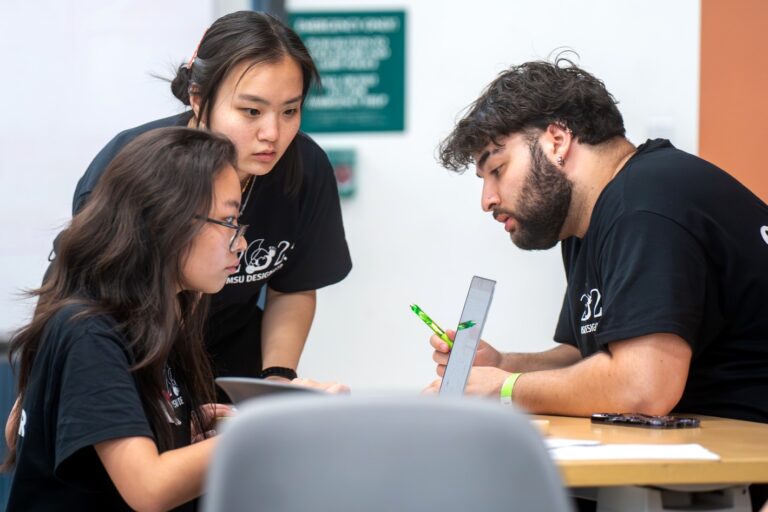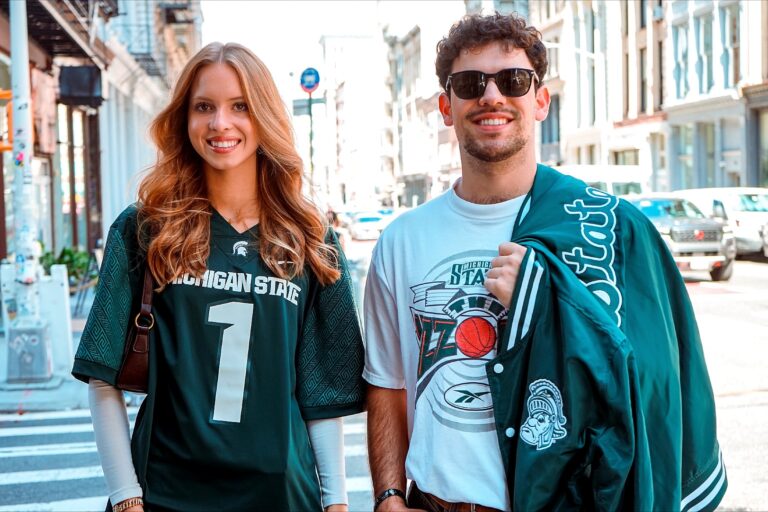Four Michigan State University students stepped into the spotlight in New York City as featured designers at the 2025 “iCAN Do Anything” Fashion Show hosted by the International Institute for the Brain (iBRAIN) to celebrate and promote adaptive and inclusive fashion.
The MSU students — Jillian Kelly, Tristian Laney, Rico Seatts, and Reagan Wiley — all majoring in Apparel and Textile Design (ATD), were among a select group of designers who created custom adaptive garments for students with brain-based disabilities. The iBRAIN students then modeled these one-of-a-kind outfits as they walked or rolled down the runway of iBRAIN’s Fourth Annual “iCAN Do Anything” Fashion Show, held Sept. 10, 2025, in Manhattan during New York Fashion Week (NYFW).




“This experience was transformative for our students and allowed them to apply their design skills in the most meaningful way possible,” said Saetbyul Park, Assistant Professor of Apparel and Textile Deign at Michigan State University, who initiated and facilitated the collaboration between MSU and iBRAIN. “It expanded their perspective on inclusive design and gave them the opportunity to apply their creativity to solve real-world challenges. They represented MSU with creativity, compassion, and professionalism and made a lasting impact on everyone involved.”
“This experience was transformative for our students and allowed them to apply their design skills in the most meaningful way possible.”
Saetbyul Park, Assistant Professor of Apparel and Textile Design
With this year’s fashion show theme being “My Voice Through Fashion,” the MSU students worked closely with the iBRAIN community, through virtual design sessions and interviews, to custom design clothing that was not only functional but empowering, fitting each iBRAIN student’s personality and needs. Their work reflected an impressive blend of creativity, empathy, and technical skill, earning heartfelt praise from families, educators, and fashion show organizers.
“Your designs didn’t just clothe our kids,” said Alice Pavlov, iBRAIN Marketing Associate and Lead Project Coordinator for the “iCAN Do Anything” Fashion Show, “they celebrated their personalities, honored their unique needs, and revealed their strength and beauty to the world.”
Adaptive Fashion
Adaptive fashion focuses on creating clothing that meets the needs of individuals with disabilities, sensory sensitivities, or mobility challenges, rethinking traditional garments to make them easier to wear and more expressive.
“Active inclusion, in this context, means intentionally involving diverse designers, models, and collaborators to ensure that fashion is accessible, functional, and empowering for everyone, regardless of ability,” said Park, who also serves as faculty advisor for the Fashion Design Student Association (FDSA) at Michigan State University.



The work required the MSU students to move beyond the traditional design studio mindset and into a collaborative, user-centered process. Each student designer was paired with one or two iBRAIN students who served as the inspiration behind the adaptive fashion designs. The student designers met multiple times, both virtually and in person, with the iBRAIN students and their families to understand their preferences for color, texture, and style as well as specific accessibility needs such as adaptive closures or G-tube access.
The result was a collection of garments that were not only functional but expressive — reflecting each model’s individuality, personality, and joy.
“Even though my design for this event is likely not going to ignite a prolific viral fashion moment, I can honestly say that the joy and happiness that it has brought to just one person makes it feel just as influential.”
Reagan Wiley
“This experience, this moment, and this special young man has reshaped my aspirations to become much more focused and has shown me the importance of how one outfit can inspire, motivate, and uplift a person to do amazing things,” said Wiley, an MSU senior, who designed and personalized an outfit for 12-year-old Andre while keeping his mobility and medical needs in mind. “Taking part in this iBRAIN event has been incredibly special and fulfilling. Even though my design for this event is likely not going to ignite a prolific viral fashion moment, I can honestly say that the joy and happiness that it has brought to just one person makes it feel just as influential.”
Student Innovators and Leaders
The 2025 “iCAN Do Anything” Fashion Show” showcased the work of 19 designers from seven different universities and one high school. The four students selected to represent MSU demonstrated a strong interest in adaptive fashion and have distinguished themselves as innovators and leaders within the Apparel and Textile Design program.
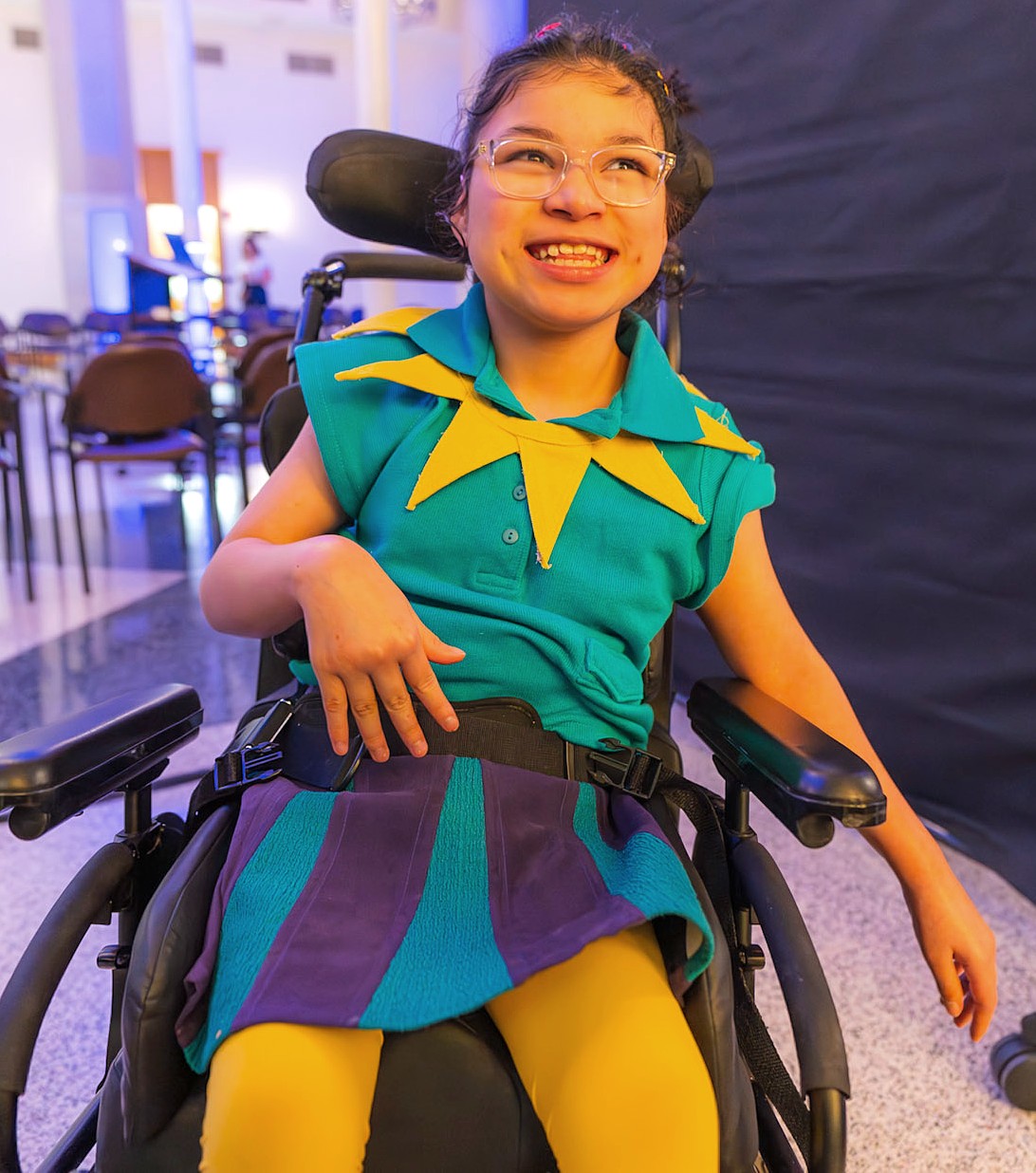


Two of the MSU students – Kelly and Laney – attended New York Fashion Week in the past. Kelly attended in February 2025 as one of the winners of MSU’s University of New York Fashion Week (U of NYFW) Competition, and Laney attended in September 2024 as one of the inaugural winners of the MSU Branding and Licensing ATD BFA Fashion Week Award.
“This year’s theme really resonates with me as it is about celebrating courage, creativity, and individuality. Fashion has this incredible power to tell a story and showcase the unique personality of each person who wears it,” said Kelly, an MSU senior who also is majoring in Business Management and who designed outfits for two iBRAIN students, Hope and Tau. “This has been such a meaningful and exciting experience. From the very beginning, I wanted the outfits to make them feel true to who they are while also challenging me creatively as a designer. I am so grateful to have been part of this show.”
“This has been such a meaningful and exciting experience. From the very beginning, I wanted the outfits to make them feel true to who they are while also challenging me creatively as a designer. I am so grateful to have been part of this show.”
Jillian Kelly
Beyond their creative and technical skills, the students’ empathy and professionalism stood out. Each designer approached the process with sensitivity and an open mind, eager to learn from their iBRAIN collaborators. For many, the experience was their first exposure to adaptive fashion and served as a powerful reminder of the role fashion can play in promoting dignity and self-expression.
“Through this project, the students developed a deeper understanding of user-centered design,” Park said. “They learned how to adapt their creative process to meet specific functional needs without compromising aesthetics. The collaboration also strengthened their teamwork, communication, and professional presentation skills.”


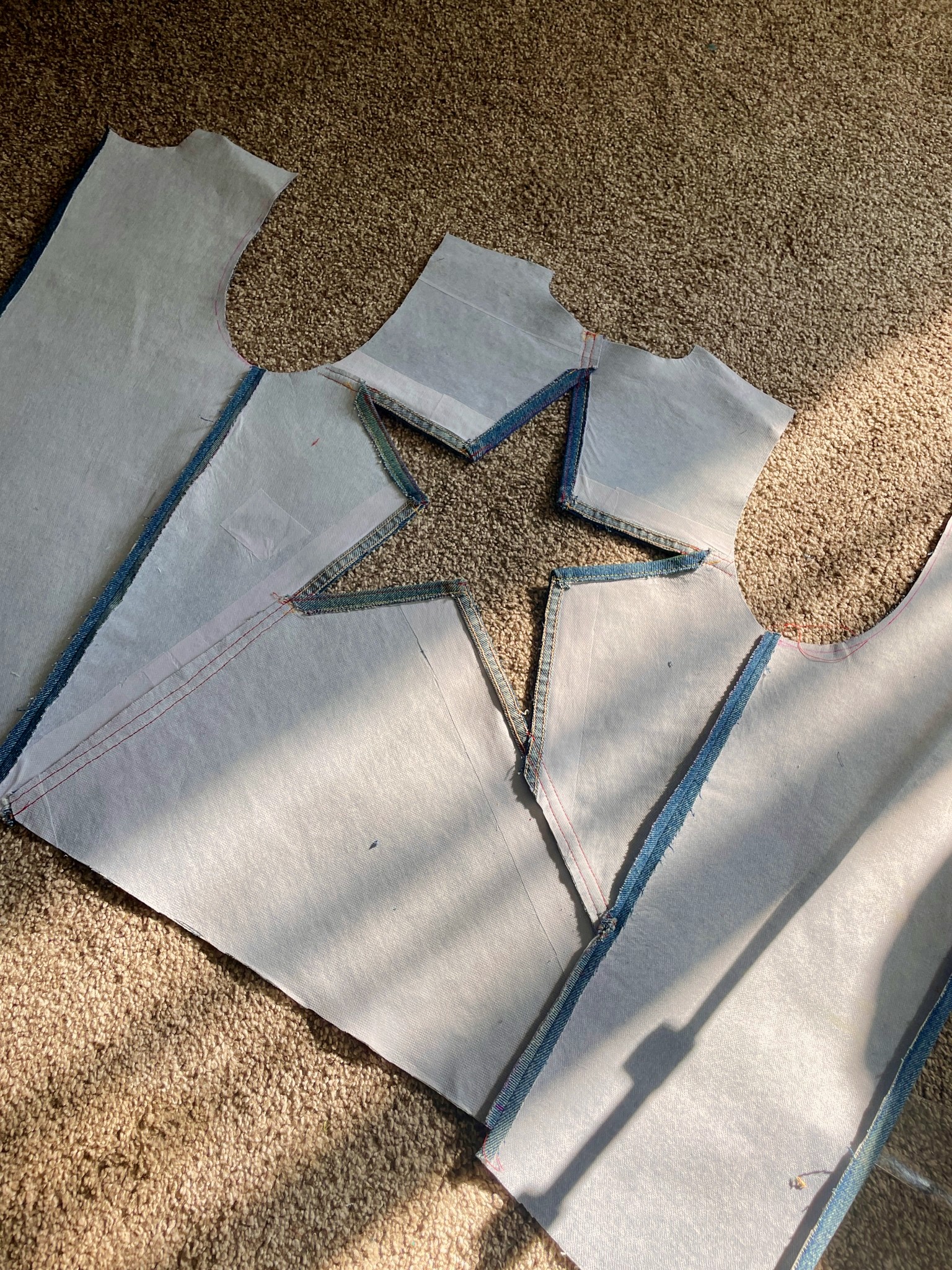





Collaboration and Transformation
The collaboration between MSU and iBRAIN began when the New York–based educational institute reached out earlier in 2025 to explore a potential partnership.
“The International Institute for the Brain (iBRAIN) contacted us in February 2025 to propose a collaboration,” Park said. “Following that, we held meetings with the Fashion Design Student Association to explore the opportunity and recruit students from our program to participate.”
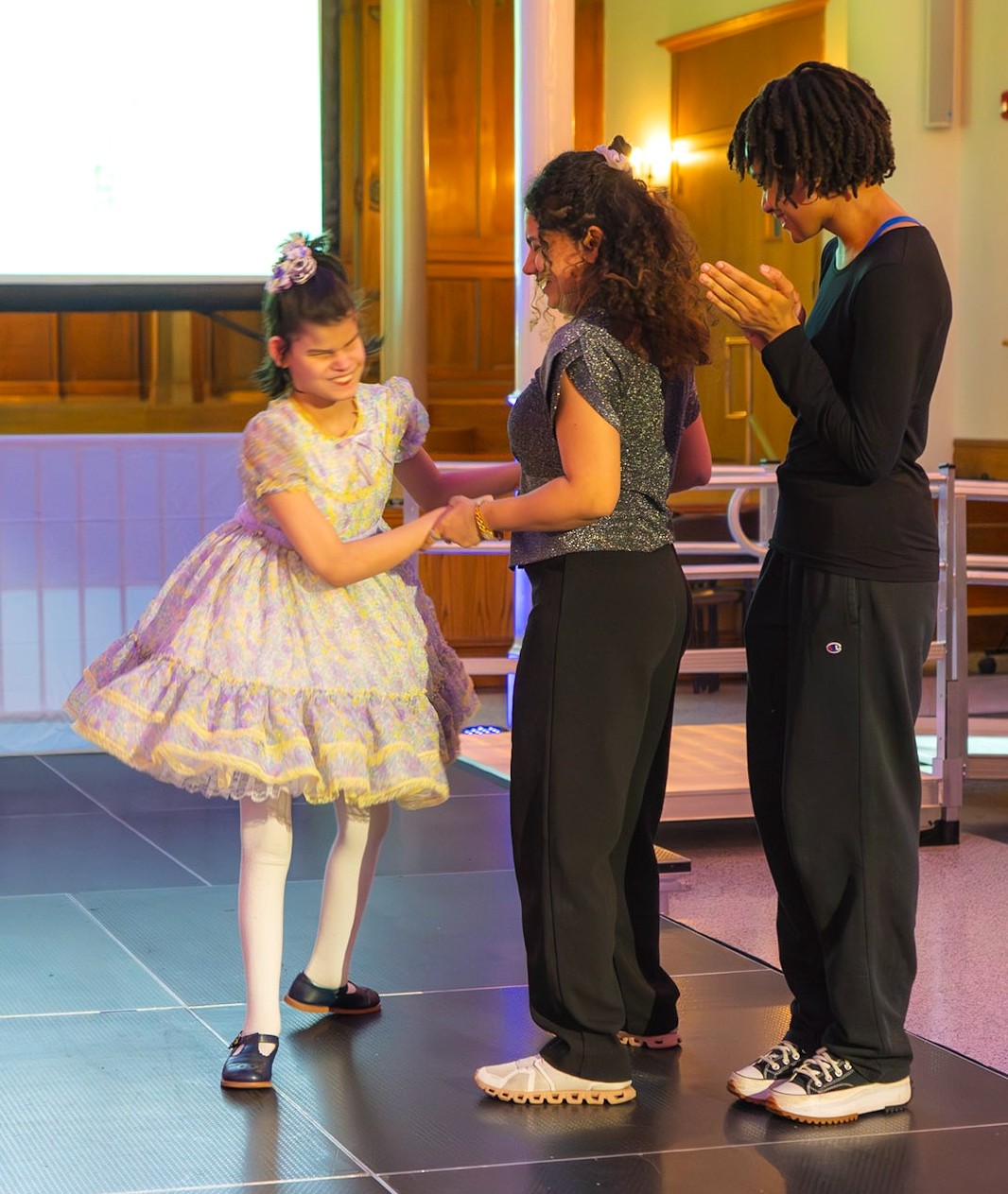

As the faculty advisor to the student team, Park played a key role in organizing and guiding the project from concept to runway.
“As the faculty advisor of FDSA, I initiated and facilitated the collaboration with iBRAIN, organizing meetings between our students and the iBRAIN team,” Park said. “Throughout the design process, I monitored the students’ progress and coordinated communication with Alice Pavlov, the marketing associate at iBRAIN, to ensure everything stayed on track.”
Continuing the Collaboration
Following the success of the 2025 show, MSU plans to deepen its partnership with iBRAIN in the coming years.
“I see great potential for a long-term partnership,” Park said. “This collaboration has opened the door to more inclusive design initiatives and interdisciplinary projects. We hope to continue working with iBRAIN on future fashion shows, internships, and possibly research projects that further explore adaptive fashion and inclusive design practices.”



By integrating adaptive design into the curriculum and giving students hands-on opportunities to collaborate with diverse communities, MSU is preparing future designers to think critically about accessibility and representation.
“This project was a meaningful step toward building a more inclusive fashion industry,” Park said. “I’m incredibly proud of our students’ professionalism, creativity, and open-mindedness throughout the experience. It was a privilege to witness the impact of inclusive design on both the designers and the iBRAIN students.”
Watch a recording of the 2025 “iCAN Do Anything” Fashion Show.
By Austin Curtis and Kim Popiolek

